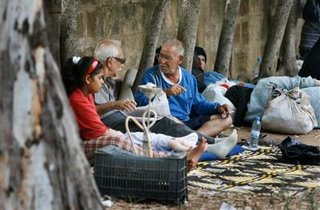 Visiting Beirut, Jan Egeland, the United Nations emergency relief coordinator, expressed shock as he realized the scale of the devastation. "It is horrific. I did not know it was block after block of houses," he said. Most of us don't, either, as the images on television fail to show the aggregate size of the destruction. In his estimate, from half a million to 1 million Lebanese civilians have been turned into refugees, and humanitarian aid totaling $100 million will be needed now to avoid a catastrophe. Egeland will be in Jerusalem to try to convince the Israeli authorities to open the necessary humanitarian corridors and allow for the safe passage of humanitarian aid. Failure to allow for that would result in additional collective punishment.
Visiting Beirut, Jan Egeland, the United Nations emergency relief coordinator, expressed shock as he realized the scale of the devastation. "It is horrific. I did not know it was block after block of houses," he said. Most of us don't, either, as the images on television fail to show the aggregate size of the destruction. In his estimate, from half a million to 1 million Lebanese civilians have been turned into refugees, and humanitarian aid totaling $100 million will be needed now to avoid a catastrophe. Egeland will be in Jerusalem to try to convince the Israeli authorities to open the necessary humanitarian corridors and allow for the safe passage of humanitarian aid. Failure to allow for that would result in additional collective punishment.One hundred million dollars isn't much. In fact, it's so small an investment that I think Israel should pay for most of it. This, more than rhetoric, would send a signal to the Lebanese people that it is not at war with them, but against Hezbollah. Granted, after pounding the city for 12 days in a row, the disbursement of $100 million would hardly manage to convince the families of the 370 Lebanese killed and thousands wounded, but that would be a start, a signal of goodwill. I fear, however, that this is confabulation and that in the end that money will come from international donors.
But what is $100 million? Let's put things in perspective. It buys you about 1.5 of the 100 F-16I that Israel has ordered, at a cost of $4.5 billion, from its sponsor, the U.S. government. Or two AH-64 Apache attack helicopters Israel has also been using in Lebanon. In other words, tens of thousands of lives could be saved at the cost of a single one of the very fighter aircraft, or two of the helicopters, that have been raining barbarity upon the Lebanese. Couldn't Israel spare one aircraft to save a neighbor it says it isn't at war with? Moreover, considering that U.S. taxpayers send on average $5 billion annually to Israel, this means that the Jewish state hasn't even been using its own money to buy its weaponry. Shouldn't ordinary Americans therefore request that at the very least Israel pay its share of the humanitarian requirements for Lebanon? Again, this is unlikely, and Americans will generously give to the Red Cross and other aid agencies, oblivious, meanwhile, that they are being hoodwinked, that one half of their dollar is trying to counter what the other half is doing, an effective canceling-out of hard-earned money that surely could be better spent elsewhere.
In all fairness, we should also ask Hezbollah and its sponsors to provide financial compensation to Israel for the damage that has been caused on the Israeli side during the present conflict. But one thing is certain: the requirement would not come even close to the $100 million that is needed immediately for Lebanon.

No comments:
Post a Comment
Note: Only a member of this blog may post a comment.